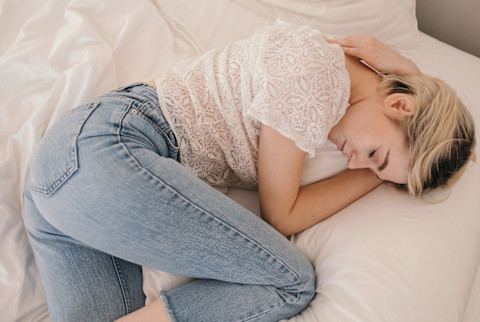Can’t Sleep Before Your Period? Here’s Why — & What Helps

You know that week before your period when you're inexplicably exhausted, yet somehow can't stay asleep? When you're snapping at everyone and can't figure out why? Turns out, your hormones aren't just messing with your mood—they're quietly impacting your sleep, too.
And it goes both ways. While hormonal fluctuations disrupt your rest, poor sleep actually intensifies PMS symptoms, creating a frustrating cycle that can leave you feeling like you're fighting an uphill battle each month.
Research confirms what you already know
A study examining ~250 young women found that poor sleep quality was significantly linked to more severe PMS symptoms1, including anger, anxiety, mood swings, crying spells, and fatigue. Among the women studied, nearly half experienced severe PMS symptoms, and the worse their sleep quality, the more intense their premenstrual struggles became.
So, what's happening hormonally?
Your hormones are working the night shift
In the days leading up to your period, progesterone levels take a sudden nosedive. This hormonal shift throws off your body's temperature regulation (a crucial factor for quality sleep) and reduces the amount of REM sleep you get (that's the dream-rich stage that helps with emotional processing and memory consolidation).
Less REM sleep means you're not getting the restorative rest your body needs, which can amplify mood swings, irritability, and that all-too-familiar premenstrual fog.
Sleep disorders aren't just a symptom of PMS; they're actually recognized as a significant risk factor that can make your premenstrual symptoms worse. It's a cycle: Poor sleep intensifies PMS, and PMS disrupts sleep.
The takeaway
Sleep isn't just another thing PMS impacts—it's a lever to feel better.
Start by giving yourself an extra 30 minutes to wind down before bed during your premenstrual week. Get outside for morning sunlight exposure to keep your circadian rhythm steady. Move your body daily (even a 20-minute walk counts). And keep your bedroom cool, quiet, and dark
These aren't band-aids; they're evidence-backed strategies that address the root cause, helping you sleep better so you can actually feel better when PMS hits.
